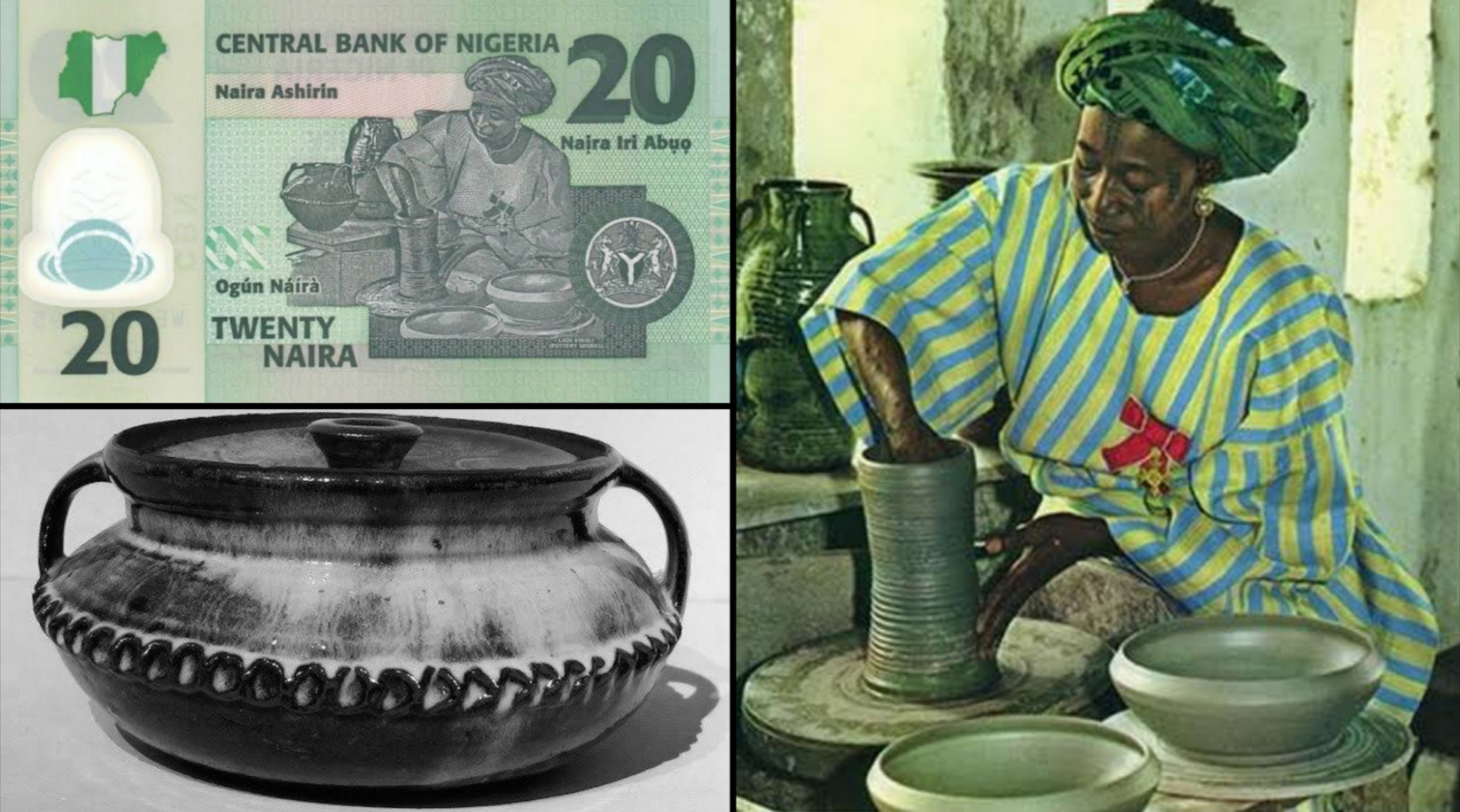Ladi Kwali, OON, MBE (c.1925– August 12, 1984) was a Nigerian potter.
Ladi Kwali was born in the village of Kwali in the Gwari area of Northern Nigeria, where pottery was an indigenous female custom. Her aunt taught her how to coil pottery as a child.
She fashioned large pots from clay coils, pounded from the inside with a flat wooden paddle, for use as water jars, cooking pots, cups, and flasks. They were decorated with incised geometric and stylized figurative designs such as scorpions, lizards, crocodiles, chameleons, snakes, birds, and fish.
She would imprint patterns on top of the figures by rolling small roulettes of twisted string or notched wood across the surface of the clay, often as horizontal banding and sometimes in vertical panels.
The wooden roulettes were small cylinders of hard wood, two or three inches long and a half-inch in diameter, notched with straight, oblique, or parallel designs.
The earthenware vessels and decorative techniques date back to the Neolithic period.
They were burned in a bonfire of dry vegetation, as is customary in the region. Her pots were noted for their elegance of shape and decoration, and she was recognized regionally as a talented and eminent potter.
She was born in 1925 in the small village of Kwali, Kwali Area Council today is part of the Federal Capital Territory (Other historians indicate her date of birth is actually 1920).
She grew up in a family where the folkloric female practice of pottery making was passed down through the generations. “Even in the early years of pottery making, Ladi Kwali excelled in the crafts, and her wares were always sold even before they were brought to the markets,” said Mallam Mekaniki Kyebese, Ladi Kwali’s younger brother.
The traditional cultural environment inspired her to create pottery pieces that were influenced by the Gbagyi tradition and accentuated with personal idioms during her early professional years. Mathematical undertones echoed her approach to clay, which were evident in the constant show of symmetry.
Career of Ladi kwali
Michael Cardew, who was appointed to the position of Pottery Officer in the colonial Nigerian Government’s Department of Commerce and Industry in 1951, established the Pottery Training Centre in Suleja (then known as “Abuja”) in April 1952. Ladi Kwali became the Abuja Pottery’s first female potter in 1954.
She studied wheel throwing, glazing, kiln firing, saggar making, and slip use there, eventually becoming an instructor. She decorated bowls with sgraffito, which entailed dipping vessels in red or white slip and then scratching the decoration into the underlying body with a porcupine quill.
By the time Cardew retired in 1965, the Centre had recruited four more Gwari women: Halima Audu, Lami Toto, Assibi Iddo, and Kande Ushafa.
These women handcrafted large water pots in one of the workshops, which they dubbed Dakin Gwari (the Gwari room). They’d use a snail’s shell, a rough seed pod, or a calabash rind to form and scrape the insides of the containers.
Then they modified their conventional incised designs by inlaying white kaolin and feldspar slip into the depressed decorations.
The areas with slip will appear light green after firing with a transparent celadon glaze, in contrast to the dark green or iron red stoneware body of the vessels.
The hand-built, ornately painted pots reflect an unusual combination of traditional Gwari and western studio pottery since they were glazed and fired in a high-temperature kiln.
The classic Ladi Kwali pot was coiled in stoneware clay and painted with lizard patterns before being shot with a dark shiny glaze. The dark glaze was a symbol for the pots’ “Africanness” for Western viewers and collectors.
Ladi Kwali’s ceramics were “craft pieces” as a result of her cultural background, in which females were predominantly responsible for pottery.
Ladi Kwali’s pots were shown in international exhibitions of Abuja pottery organized by Cardew in 1958, 1959, and 1962. Kwali performed demonstrations in the United Kingdom in 1961 at the Royal College, Farnham, and Wenford Bridge.
During this time, she also gave demonstrations in France and Germany. She toured America with Cardew in 1972. Her work was exhibited at the Berkeley Galleries in London to great acclaim. In the early 1980s, the Abuja Pottery was renamed the Ladi Kwali Pottery.
Her Awards and achievements
In 1962, Kwali received an MBE (Member of the Order of the British Empire).
She received an honorary doctorate degree from Ahmadu Bello University in Zaria in 1977.
In 1980, the Nigerian government (through the Cabinet Office of the Federal Republic of Nigeria) invested on her the Nigerian National Order of Merit Award (NNOM), the country’s highest academic honor.
In 1981, she was also awarded the national honor of Officer of the Order of the Niger (OON).
Her image can be found on the back of a Nigerian N20 Naira note. Ladi Kwali Road is a main road in Abuja.
With ten meeting rooms and four ballrooms, the Sheraton Hotel houses the Ladi Kwali Convention Center, one of Abuja’s largest conference facilities.







